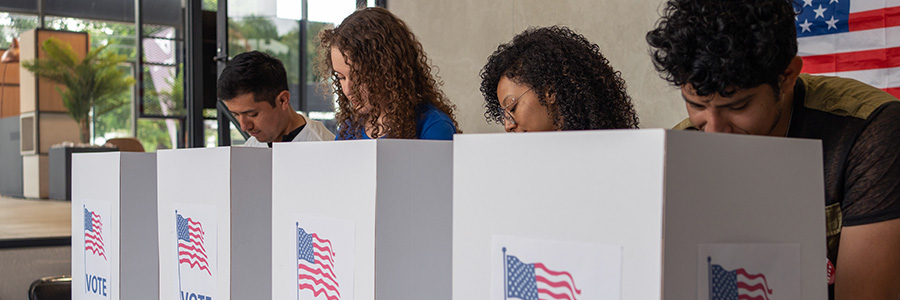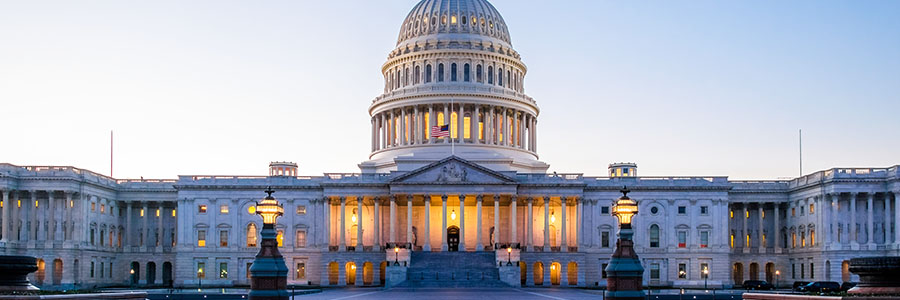Speaker 1:
Welcome to TD Cowen Insights, a space that brings leading thinkers together to share insights and ideas shaping the world around us. Join us as we converse with the top minds who are influencing our global sectors.
Chris Krueger:
Good morning. Welcome back to TD Cowen Street Cred. I am Chris Krueger with TD Cowen's Washington Research Group, and we'll attempt to translate K Street to Wall Street faster than a speeding Acela and even faster if you juice up the playback.
All right, we're now two for two. To paraphrase Coach Lou Brown, we won a pod last week. If we win today, it's called two in a row, and if we win again next week, it's called a winning streak. It has happened before. So with six weeks until the election hopefully ends, wanted to flag three areas we are watching. It's still 2024, so expect the unexpected.
Okay, number one, Omaha somewhere in middle America. Why does this matter? Well, if neither Trump nor Harris get 270 electoral college votes, the election is decided by the newly elected House on January 6th. Each state delegation gets one vote. This last happened under the 12th Amendment in 1825. Why are we talking about it now? Well, two states award their electoral college votes via congressional district. That's Maine and Nebraska. In 2020, the Omaha based district went for Biden and the main second district went for Trump. Trump allies are pushing the Nebraska legislature to change this, which would very likely give all five votes to Trump. Nebraska has this unique legislature, they need 33 votes. There are 33 Republicans, but it doesn't sound like the votes are there. This could really matter because it could deprive either candidate from securing 270.
If Harris wins the blue wall of Pennsylvania, Wisconsin and Michigan, doesn't win any of the Sun Belt states, she's stuck at 269. So if no one gets to 270, the newly elected House votes for the president on January 6th. Again, each state delegation gets only one vote. So Wyoming gets one, California gets one and so on. And this would favor Trump. The Senate actually votes for VP.
Maine had previously said they would switch their process if Nebraska went forward, although their legislative session is over. So stay tuned on this front. If the election remains undecided by January 20th, let's say on January 6th the Congress can't figure it out, the 20 amendments kicks in and the VP elect is president. If no VP elect, the Presidential Succession Act makes the Speaker of the House next in line. So there is a plan, but it could be bumpy.
Okay. As we know, geography largely dictates the Electoral College. Something else to keep in mind, the so-called pivot counties. So there are 3,244 counties in the US. 206 of those counties voted twice for Obama and then for Trump in 2016. Biden won back 25 of them in 2020. Over 80 of them are in four states in the region anchored around Iowa. This is largely Tim Walz country. He represented eight of them from his congressional district in Minnesota. Think this really underscores some of the polling we've seen since the debate. The recent Des Moines Register poll by Ann Selzer, really kind of one of the gold standards, was really interesting. Not that Iowa is in theory in play, but that Des Moines Register poll, which really tracks these pivot counties, Trump is only leading 47/43. Trump was up by 18 points in June over Biden before Biden dropped out. So yes, the Electoral College, but if you really want to drill down, take a look at some of those pivot counties. They're largely upper Mississippi River Basin.
All right. Finally, number three, election night, which six weeks from tonight, we'd be surprised if the presidential election and the fate of the Congressional majorities was known by the market open on Wednesday. If you go back and look at 2020, it took a while. However, there are some what we would call early warning wave indicators that could help gauge the election results on the East Coast where polls close earlier, one way or the other. And we'd flag three states on this.
The first is Virginia. This was one of the first states in 2016 that suggested a Trump win. Given that it took such a long time for the state to be cleared for Clinton. That wasn't the case in 2020. It was called pretty early in the evening for Biden. But if that state takes a while to come in, that's a good sign for Trump. Florida is another one. This is sort of a reverse. Virginia. If Trump doesn't lock this up early, could be a good sign for Harris. And if the Democrats have any chance at holding the Senate, this really could be the place after Texas if Montana does go down to the wire. So keep an eye on Florida and Virginia as wave indicators on either side.
And then finally, North Carolina. This is a state that Obama won in 2008, albeit only by 14,000 votes. Lots of attention to the governor's race here. Democrats likely to win that governor's race. It's really hard to see Trump's arithmetic to 270 without North Carolina. It's a state that should come in relatively early. So if that's a state where, again, if it took a while and or if Harris pulled out a win there, that's a really good night for Harris.
Okay, that's a wrap. We'll be back next Tuesday. This has been Chris Krueger with TD Cowen's Washington Research Group for Street Cred.
Speaker 1:
Thanks for joining us. Stay tuned for the next episode of TD Cowen Insights.









